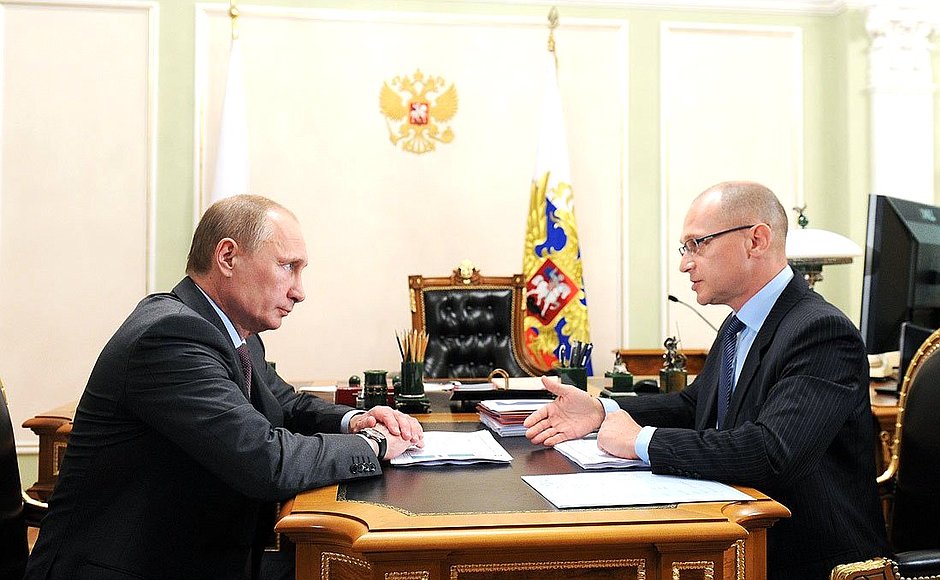
New Managing Director for Bellona Norway
The Board of the Bellona Foundation has appointed former Minister of Climate and the Environment Sveinung Rotevatn as Managing Director of Bellona No...
News

Publish date: December 7, 2016
News
Sergei Kiriyenko, three months off his post as head of Russia’s nuclear industry, is emerging as a broker between nonprofit groups, environmental rights advocates and President Vladimir Putin.
In early October, Kiriyenko made a lateral slide from running state nuclear corporation Rosatom to take up a position as Putin’s First Deputy Head of the Presidential Office, a job that has him running domestic affairs and mediating the relationship between the president and the people.
As a career politician who emerged in the late 1990s with a raft of youthful reformers – including the murdered Boris Nemtsov – hopes were elevated that Kiriyenko’s new position would introduce Russia to a kinder, gentler Putin.
That was a questionable expectation. Kiriyenko’s liberal credentials, now as then, are only conveniently accidental.
His long government service in wildly varying positions, from Prime Minister to the CEO of state nuclear hopes, suggests he’s an able technocrat and footman unallied to any ideology, and his new post a move in the lead up to the 2018 presidential election.
 Rosatom's headquarters in Moscow.
Credit: Charles Digges/Bellona
Rosatom's headquarters in Moscow.
Credit: Charles Digges/Bellona
Commentator Alexei Muchin, with the Center for Political Information, thinks Kiriyenko will be in charge of burnishing Putin’s authoritarian image. Kiriyenko’s role, said Muchin, is to “correct the Russian political system” and balance the “extreme conservatives and radical liberals.”
Part of that balancing act recently put Kiriyenko in a position to massage yet another raft of possible amendments to Russia’s stifling law on foreign agents engaged in so-called “political activity,” which has upended non-profit sector since it became law in 2012.
The chief difficulty of the law is that any group seeking to change anyone’s mind about virtually anything gets vilified as being a spy. Numerous projects to narrow the interpretation of political activity have only served to make the definition more pliable.
On Tuesday, Kiryenko met with Mikhail Fedotov, head of the Presidential Council on Human Rights and Civil Society. Fedotov has spearheaded all official efforts since the NGO law’s inception to bring legal focus to what political activity means.
The meeting was intended as a briefing from Fedotov prior to a one-on-one with Putin to discuss the law again “in the coming days.” Kiriyenko’s job, apparently, was to get the gist of the Human Rights Council’s new complaints.
Russian media reported that Kiriyenko didn’t think the law needed to be repealed – which has long been a central demand of rights activists, and at one point even Fedotov himself. But Kiriyenko scored points for agreeing with Fedotov that the law should be changed.
No concrete reforms for the law were discussed, but both men where quoted by Russia’s RBK news agency as saying the meeting was “open,” “frank” and detailed.”
It fell to people who weren’t in the room to spell out exactly what the Fedotov and Kiriyenko were talking about, namely that environmental conservation organizations shouldn’t get slammed by the government simply for suggesting environmental improvements.
A Kremlin source told RBK that, as far as Kiriyenko was concerned, there should no longer be situations wherein an environmental group writes a letter to a regional governor with the suggestion of creating a nature reserve, for example, only to later find that letter used as evidence that the group is engaged in political activity.
Andrei Babushkin, another member of the Human Rights Council further said groups that have fallen onto the foreign agent list should have some way of getting off of it.
Expecting the NGO law to undergo any radical transformation, especially in a year before a presidential election, would be ludicrous: Putin’s memory of the organized protests against his reelection in central Moscow is far too fresh for that.
But doing something – like introducing an appeals process for foreign agents and leaving environmental organizations alone – would make the law look a lot more legitimate.
Kiriyenko seems well poised to do that. His tenure at Rosatom brought about a moderate level of engagement between the nuclear industry’s hardboiled bureaucrats and environmental organizations.
Even though most environmentalists can’t put their finger on what, precisely, Rosatom’s yearly “Forum-Dialog” discussions are meant to accomplish, the fact that Rosatom officials actually sit in the same room as activists has somewhat dismantled the industry’s monolithic stature and made it, if not kinder, than at least less supernatural.
While Kiriyenko likely won’t relieve the intentionally inflicted stress of the law on non-government organizations, he might be able to accomplish something like what he accomplished at Rosatom in the Kremlin – an accidental awareness of non-government organizations’ more politically benign functions.

The Board of the Bellona Foundation has appointed former Minister of Climate and the Environment Sveinung Rotevatn as Managing Director of Bellona No...

Økokrim, Norway’s authority for investigating and prosecuting economic and environmental crime, has imposed a record fine on Equinor following a comp...

Our op-ed originally appeared in The Moscow Times. For more than three decades, Russia has been burdened with the remains of the Soviet ...

The United Nation’s COP30 global climate negotiations in Belém, Brazil ended this weekend with a watered-down resolution that failed to halt deforest...